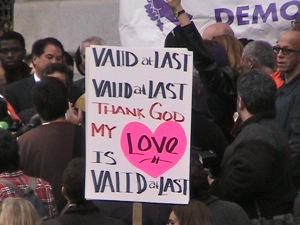As a religious person, my primary political goal is reducing poverty. With that as my main criterion for judging U.S. political parties, I generally consider both the Democratic party and the Republican party failures. While Democrats are somewhat willing to provide expensive programs to alleviate poverty, these days they seem unwilling to address the basic structural problems within the United States that lead to poverty. While many individual Republicans are very devoted to reducing poverty, not least because many Republicans are devoted Christians for whom reducing poverty is a requirement of their religion, as a whole the party still seems mired in trickle-down economics, which is really a form of Social Darwinism: let the rich thrive, and the poor may eat the leavings from their tables.
Given that both Democrats and Republicans pay at least lip service to the goal of reducing poverty, why have they both been so ineffectual on this issue? Probably because both parties have gotten important things wrong. Ron Sider, in a review of Lew Daly’s new book God’s Economy: Faith-Based Initiatives and the Caring State in the Christian Century magazine, says this about George W. Bush’s faith-based initiative, which has also been embraced by Barack Obama:
Bush was right in rejecting the dominant Reagan-Republican push to abandon governmental responsibility to alleviate poverty. (Liberal critics who said that government abdication of responsibility was the real goal [of Bush’s initiative] were wrong.) Bush was also right to embrace a much wider role for nongovernmental, including religious, organizations in the delivery of government-funded anti-poverty programs. (Liberal critics who charged that is was discriminatory to protect the freedom of religious organizations, especially their freedom to hire staff who share their faith commitments, were wrong.) Tragically, Bush failed to provide enough funding to combat poverty and failed to how an unrestrained market economy threatens families and communities just as much as an all-powerful government does. (Liberal critics were on target here.)
This is an interesting argument, and I’m going to have to read Daly’s book. Perhaps there is a way to make Bush’s and Obama’s faith-based initiative work. However, I remain skeptical of the faith-based initiative for at least four reasons. Continue reading

